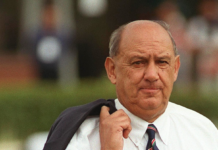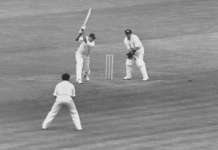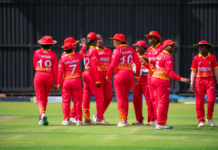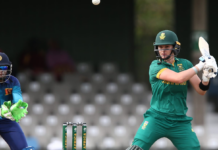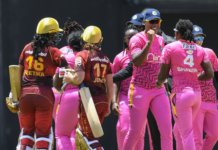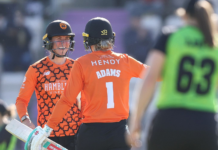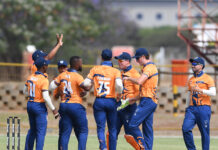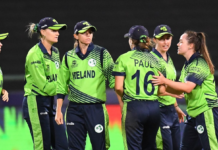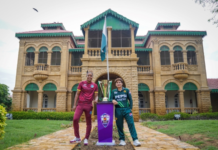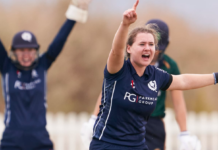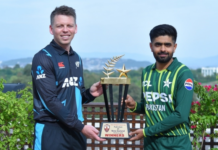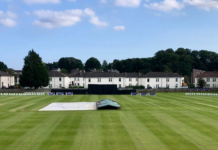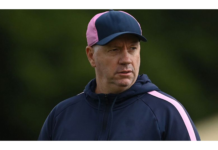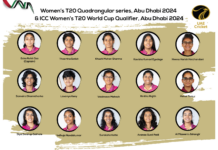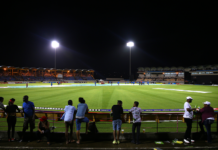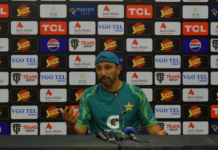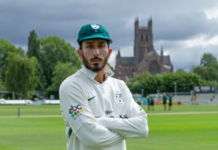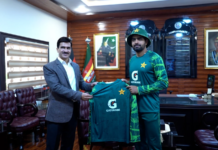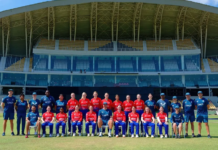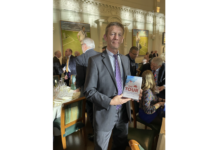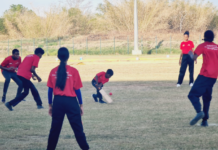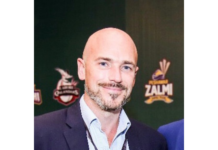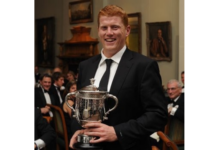Photo Credit: Cricket West Indies
Reforming Cricket West Indies for Improved On-Field Results
Address by Ricky Skerritt, President CWI
At The Sir Frank Worrell Memorial Virtual Lecture (UWI) – November 16th, 2020
Good evening ladies and Gentlemen. I acknowledge the distinguished members of the audience who have taken the time to be with us tonight. I am aware that the Sir Frank Worrell Memorial lecture series is an extremely prestigious event with an impressive history. The list of past speakers in itself makes me feel humbled and honored just to have been invited to speak with you. Thank you to the UWI faculty of Sports for inviting me. I must confess that speaking at this event has forced me to do more writing over the past two days than I have done for a long time.
For tonight’s purposes I will assume that the word “lecture” means that I am allowed to share some information and ideas of my choice, designed to further an ongoing conversation about West Indies Cricket and its importance to the life and livelihoods of people in our region. I do not intend to be professorial, or to sound off as if I am some kind of technical expert, which I am not. Nor do I intend for my talk to take the form of a major history lesson.
But one does not have to be a historian to be in awe of the true Legends of West Indies cricket and to know that there are individuals who have indelibly impacted and shaped West Indies cricket and the culture and history of our region. Sir Frank Worrell is clearly one such outstanding individual. And it is my distinct pleasure to speak at a lecture series that has been named in his memory.
As the first black man to be appointed permanent captain of the West Indies, Sir Frank Worrell was entrusted with what must have been the most difficult task in the history of West Indies cricket. I say “most difficult” because he simply could not afford to fail under the circumstances that prevailed at the time, at the end of the 1950’s. He was made captain, some 32 years after West Indies had first been granted Test Match status in 1928. His resounding suitability for the leadership role must have helped the selectors to dispense with the tradition of picking a captain of lighter skin colour, often with an English University background. The socio-political environment itself, over which Worrell had no control, must have placed Sir Frank under immense pressure to succeed. And no one knew it more than him. But it was the manner in which he achieved his successes, rather than the triumphs themselves, for which he is best remembered.
It was under Worrell’s leadership that the West Indies team first matured and became a formidable and more collective team, one that was no longer characterized only by individual feats of note. It was Worrell who first molded his team from a mix of brilliant individualists from across our region, into a cohesive unit. No Test Match was more illustrative of the benefit of the teamwork and discipline that Worrell had created, than the famous tied Test at Brisbane when he kept his team on their toes and motivated an exciting young fast bowler, just 23 years old at the time, to stay fully focused during that nail-biting last over. It will be most fitting when, later this month, a life-sized statue will be unveiled in Barbados, in tribute to Sir Wes Hall, the same young man who showed such maturity in bowling that famous over. The tribute to Sir Wes comes almost exactly 60 years after that thrilling first ever tied test in Australia. Sir Frank and the other heroes who have gone beyond, will no doubt be attending that unveiling ceremony, in spirit.
So tonight we also reflect on Sir Frank Worrell’s guidance and inspiration as a leader of specially gifted young West Indians like Wes Hall, and others who he helped put on the path to becoming a world-beating combination back in the 1960’s. It was Sir Frank Worrell, more than anyone else, who laid the foundation for the success of other cricket leaders and teams, who followed.
But what if Sir Frank was to return to the world of cricket today? He would observe that Cricket is now one of the most popular sports in the world. More than 300 million people of all ages play the game, which boasts a worldwide fanbase around one billion strong. He would also observe however that cricket has become an industry and that the cricket world is changing fast.
Sadly, Sir Frank would also note that West Indian cricket on field success does not come quite as frequently as it did when he was captain. He would see that regional cricket administrators have been grappling for the past 20 years or so with declining and inconsistent team performances, in all three formats of the game. Having won most of the Test Matches in which he captained, Sir Frank would be disappointed to find that of the 194 Test matches played by West Indies in the past twenty years alone, we have lost 104, and won only 41, or 21%. In the same period we have won only 32% of the 434 ODI’s, and 45% of the 124 T20 Internationals we have played at home and abroad. The data would tell him that in the same 20 years, West Indies selectors put more than 150 individual players and 18 different captains on the field to represent the West Indies. This was the same period in which West Indies fell to the bottom of the ICC rankings ladder in all three formats of the game. These past twenty years also saw our selectors pick 28 different opening batsmen, 45 fast bowlers, and 39 spinners in Test cricket alone. The selectors’ turnstiles have been busy in the past twenty years. I remind you that, except for an occasional injury break, Greenidge and Haynes were our only opening pair for at least a decade, and Lance Gibbs was the main specialist spinner for nearly twice as long.
The data suggests that the CWI Board has been pointing our fingers at the coaches as being responsible for the declining team performances. In those same past 20 years we hired 15 men’s team Head Coaches, most of whom spent very little time before they were relieved of the job. Most of the contracts of these Head Coaches were either intentionally made short-term, or were terminated well before they officially ended, suggesting that the coach was the one who had performed unsatisfactorily. Dozens of assistant coaches and supporting technical and management specialists, from all over the world, have also been hired and fired in the same twenty-year period.
This data does not include the 5 Head coaches and 13 Assistant coaches engaged for the Women’s team, just in the past 7 years since our Women’s program began in earnest. I remind you that just three years ago, in 2017 after what was a disappointing ODI World Cup performance, the entire Women’s Coaching staff was dismissed immediately on their return home. This came just one year after almost the same women’s team and coaching staff had brought great joy and celebration across our region after winning the T20 Cricket World Cup.
West Indies Cricket Team Results – since 2000

Total unique players – 158
Total unique players to have played all 3 formats – 49
West Indies Men’s Head Coaches – since 2000
- Roger Harper
- Gus Logie
- Bennett King
- David Moore
- Henderson Springer
- John Dyson
- David Williams
- Otis Gibson
- Stuart Williams
- Phil Simmons
- Stuart Law
- Nick Pothas
- Richard Pybus
- Floyd Reifer
- Phil Simmons
To me, this data really tells the more important story of the inherent weaknesses in our local and regional cricket systems which do not sufficiently support enough of our young cricketers to become truly motivated, disciplined, skilled and mentally competitive for the global stage. The poor win/loss ratios, the numerous panicky team selection changes, the extremely high turnover of coaches, and the long list of team Captains tell a sorry story of poor returns on investment by CWI. It also suggests that West Indies cricket administrators need to be more strategic and comprehensive in addressing the growing need for us to change the way we operate and the decisions we make – as producers of the West Indian cricket products.
And the cost of personnel remuneration during the same 20 year period has been astronomical. CWI spent a Quarter Billion US Dollars on our players, coaches and full time staff during the past twenty years. This 250 Million US Dollars does not include the cost of travel, sustenance, and housing our many coaches, players and administrative support people when on tour. So CWI has undoubtedly spent heavily on our teams, without any sustainable improvement in performance. And in contrast to the relatively poor results we have achieved, we have massively increased expenditure in personnel by more than 600% in twenty years. Expenditure was poorly targeted with too much resulting waste. Altogether CWI handled in excess of 700 Million US Dollars in the past 20 years, including significant income earned from hosting the ICC 2007 ODI Cricket World Cup. What do we have to show today, after so much expenditure? Certainly not enough returns on the field of play.
In making this point about remuneration wastage, I am conscious that cricket provides a much better livelihood for players and coaches than it did pre-2000. Today’s Top players can become millionaires and we should be happy for those West Indians who have done so. But erratic governance and poor decisions at the administrative level can make the difference between a well-rewarded career and poverty for some of our players. The right to work is a fundamental right. CWI must not affect the exercise of that right by penalizing those players who seek to work elsewhere. Our public duty is all the more complex for that reason alone.
CWI PERSONNEL COST SUMMARY (2000 -2019)
i) Direct Expenditure – USD 224,395,022
ii) Expenditure in 2000 – USD 3,011,914
iii) Expenditure in 2019 – USD 18,375,640
iv) Percentage Increase over 20 years – 610%
Although the finger-pointing is continuing, especially at each other, I believe that most of our administrators and directors are now more aware of the need for strategic change and governance reform, at least on some fronts. The truth is, and I am confident that Sir Frank Worrell looking on us would agree, that CWI needs reform on all fronts if we are to get good returns on investment on the fields of play. I am clear in my own mind that pointing accusatory fingers at coaches and moving dozens of new players through our squads, has not provided CWI with the level of results that we should all be seeking.
I did not have this data to hand a year and a half ago when Dr Kishore Shallow and I told CWI voters that we would usher in change. Back then we listed a 10 point “cricket first” plan which was more of a To Do list than a plan. Action on that list is underway. But it has been further developed into ‘The West Indies Cricket First Philosophy’ also referred to as ‘Cricket First’. It forms the main substance of my speech tonight. ‘Cricket First’ is the player-centric guiding star around which CWI’s values, decisions, strategies, and actions must revolve going forward. It is also the foundation on which competence, confidence, continuous learning, self-discipline, and high standards are being built.
All components of ‘Cricket First’ must enable our cricketers to tailor and strengthen their physical and mental skills in between tours, in order to cope with the many challenges they will face during tours. ‘Cricket First’ is the overarching approach which now forms the basis upon which Cricket West Indies (CWI) plans and programs are being rebuilt.
The rebuilding will not happen overnight, but it is already happening. Just in the past year alone we have undertaken several internal studies and reviews, including a Team Selection System Review which has delivered the first ever documented and transparent selection policy, and includes unique approaches to men’s and women’s cricket. That review has also resulted in the appointment of the first ever female as a lead selector. We have also conducted a Business Situation Assessment and Financial Operations Review, also known as the PKF report. Although it was not a forensic study, it pointed towards several procurement and financial operational concerns and opened our eyes to the need for closer risk management. Our CEO and his team have also putting together an HR development plan, a Coaching Education Plan and a Pandemic Safety Protocols Master Plan. With other cricket-centric plans underway, these reviews have provided us with a number of consequential recommendations and options, most of which are already being implemented.
The most recent review that has come to hand is the Wehby Report on Governance Reform which is currently being studied and discussed for possible utilization by Territorial Board shareholders and stakeholders. It is no secret that several previous Governance reform reports were rejected by the CWI Board in the past. You can therefore expect that this Wehby Report will face various obstacles and hurdles within our Board as we attempt to move it forward. While there is already some resistance, we are doing all we can to ensure that this report does not become another political football. I am confident that this Governance report provides more recommendations on which we can agree, than disagree. Interestingly, it points to the relevance of good Governance to achieving on field results. In any event, our new ‘Cricket First’ mantra dictates that the only way that we can drive sustainable improvement to our on-field cricket results is with a healthy and focused supporting balance of Organization-wide Creative thinking, Governance reform, and Strategic decision-making.
This ‘Cricket First Philosophy’ is slowly but surely becoming the foundation upon which all key CWI strategic decisions and actions are based. We believe strongly that, for West Indies cricket to get on an upward trajectory, cricket-specific matters have to be prioritized as the #1 organizational focus over all other matters. ‘Cricket First’ must therefore be the ultimate foundation for all things CWI. But I also believe that simultaneously, the Board, Executive Management and all staff must significantly improve the transparency, accountability and quality of CWI’s operations and decision making. The big challenge is to get all concerned to understand that it can no longer be business as usual – that reacting to losses and disappointments on the field by taking knee-jerk or short term decisions off the field, is not a sustainable strategy.
The ‘West Indians First’ Policy which was adopted officially by the CWI Board in December 2019, is actually a key derivative of our‘Cricket First Philosophy’ that I am introducing to you tonight. The ‘West Indians First’ Policy is focused on empowerment and procurement. It recognizes that West Indies cricket, at its best, has always been a representation of the hopes and aspirations of the people of the West Indies, and an illustration of the heights of excellence that our small Caribbean nations can attain when we work together.
Cricket has been one of the few areas of our common West Indian culture and experiences, where together we have been able to punch above our weight, and achieve global excellence and recognition over a period of generations. That is why West Indies cricket has been aptly described as a ‘public good’ that belongs to all West Indian people no matter where we are located, across our region and the world. Unfortunately, the concept of West Indies as a “public good” is not popular among most of our cricket administrators and has been a stumbling block for Governance reform. As someone who is first and foremost a cricket fan, I have no doubt that it is not only those with a financial share who own West Indies cricket. I am very aware that there are many fans and other stakeholders who have made years of emotional investments in our players and teams. When our cricket teams and gifted cricketers showcase their excellence and toughness on a world stage, we walk taller as a West Indian people. We beam with pride as we look at our own young West Indians face up with confidence, and God-given talent, to their adversaries and best competition from across our globe.
Sadly, the inverse occurs when our teams underperform, when they look unmotivated, especially when they get badly beaten. Fans feel gravely let down, and our West Indian pride and spirit stagger in frustration. Our West Indies team being continuously low-ranked on the ICC success ladder causes strong feelings of denial and embarrassment, and stakeholders are rightly demanding explanations, solutions, and improved results.
The ‘West Indians First’ policy is therefore a timely call to action, designed to help change an organizational culture, through the empowerment of West Indian talent and production. Its main outputs must be an empowerment that impacts all players, staff and executives. It leads to the best available creativity, effectiveness, and performance excellence both on and off the field. Transitioning and reorganizing for performance improvement must therefore take place strategically and speedily. At all levels and on all fronts, CWI must engage in a series of calculated moves designed to gain global competitiveness and reignite the passion for this new cricket-centric culture – A West Indian culture where our cricket and our pride must be where they belong, at the very center. This West Indian culture is owned by the people of our entire region, and not solely by any one individual, group or country.
The West Indians First policy therefore emphasizes that properly developing at the highest possible production and performance standards, and carefully exposing and promoting Caribbean talent and service expertise, is an absolute necessity for the future well-being of West Indies cricket. The policy also emphasizes that organizational excellence off the field of play, is the prerequisite for achieving consistent world class on-field performances.
THE FIVE POLICY ESSENTIALS ARE:
This very recent West Indians First policy will only be effective if it is properly and consistently implemented. The CWI Executive Management must therefore take ownership of this call to action, while CWI Board takes responsibility for its utilization as a critically important policy. It is a necessary and timely policy which should make a major difference to the quality of the future output of West Indies cricket.
All of CWI’s key cricket decisions must be designed to develop that sense of pride and aspiration for our representative West Indies teams that has been too often absent over these past 20 years. In order to achieve a renewed sense of purpose and excellence within CWI, difficult choices and challenging decisions will have to be made.
The Cricket First philosophy and the West Indians First policy, which are interconnected and inextricable, together mandate that the revival of West Indies cricket should be developed around West Indian talent, culture, and heritage, and should aim to always achieve excellence and pride in the best of what it means to be a West Indian.
‘Cricket First’ encompasses the following key goals:
(a) Strengthening of the West Indies cricket teams, and a return to winning ways.
(b) Building on the on-field performance on four inter-connected and inter-dependent pillars – physical fitness, physical skills, mental skills, and strategic thinking. If any of these pillars is weak, performance will suffer. Mastery of these fundamentals will improve the players’ growth, competence and enthusiasm and should motivate the teams to become the best fielding, bowling and batting unit that they can be, in all formats of the game.
(c) Designing, implementing, and monitoring performance improvement practices and programs between tours, for achieving excellence during tours.
(d) Developing a sustainable and justifiable governance structure and system, off the field, that affects behavior and performance on the field. If CWI’s structure and systems are coherent, and aligned with the principles of ‘Cricket First’, performance will automatically improve.
(e) Establishing a contract of expectations between the Coaches and the Players to improve communication, teamwork, team esteem and team cohesion. This contract will properly inform the players about their roles and functions, and will help them to understand exactly what is expected of them. Players should also be allowed to express their expectations of the coaches.
(f) Promoting a common philosophy, and working cooperatively and harmoniously with Territorial Boards to improve teamwork and achieve a shared and mutually beneficial purpose. CWI and Territorial Boards must be on the same page in order to stimulate a new growth curve, and a physical and psychological rebirth and revival of West Indies cricket.
In today’s complex and rapidly changing world, to be an effective organization that produces winning teams, we must direct all of our resources towards developing appropriate and efficient cricket-specific processes and outputs. We must simultaneously embrace the concept of perpetual growth, continuous learning, and constant improvement of our human resources on every level. And we must sincerely believe, and practice, that the combined effort and joint action of the best talent and minds from across the Caribbean region is greater than the sum of the individual parts, and their separate effects.
One potential barrier to improving in a changing environment, and capitalizing on the benefits of change, is the reluctance of too many of our people to develop a sense of discipline, commitment, preparation, and follow through. Daniel Webster wrote: “Failure is more frequently from want of energy than want of capital”. Our cricketers and staff must therefore be taught to develop and implement improvement goals and priorities. And they need to understand that all improvement goals are not equal. They therefore need to identify the goals and improvement processes that will give the more significant pay-offs. And we must all have the discipline and enthusiasm to implement solutions no matter how uncomfortable or unpopular. Focus and Context are the two key things that must be put back at the center of our organizational ability if we are to once again be able to continuously punch above our small size and weight. Quite simply put, we must now do more with less.
I firmly believe that adhering to ‘The Cricket First Philosophy’ and implementing the West Indians First Policy will produce, within the next two to ten years, the following outputs that Dr Shallow and I envision for Cricket West Indies:
(a) CWI, all of its cricket teams and its various technical intervention programs, led by competent and empowered professionals, mostly of West Indian origin with respect for our proud history and culture, and with strategic minds and winning attitudes.
(b) A modern and fit-for-purpose Corporate Governance system, which is consensus-oriented, accountable, transparent, responsive, equitable, inclusive and results in the best decision-making.
(c) A well-organized grassroots program in every member territory, jointly funded by Government, private sponsors, and the local cricket association; with technical inputs and standards from CWI as needed.
(d) Kids wanting to play and enjoy cricket, and getting opportunities to do so through relevant school, community and club leagues and programs – with young boys and girls enjoying and learning the game with technical oversight by committed and competent coaches, trained centrally through CWI’s own coaching Education and Development Programs.
(e) Cricket-loving kids who are encouraged to do well academically, with access to cricket and other sports activities being used as rewards and platforms for learning.
(f) CWI (in partnership with private sponsors) delivering regional age group tournaments commercially branded as the future stars (U15) and rising stars (U17and U19) of West Indies cricket, with mentoring inputs from past players,
(g) A busy overseas tours program for emerging players (U23) being exposed to international environments and good competition, in advance of selection to the senior team.
(h) Closer monitoring and improved collaboration with the regional franchise system, to ensure adherence to minimum standards for coaching, and for player fitness and health.
(i) A player remuneration and contractual system that rewards outstanding performance, recognizes future potential, and frowns on mediocrity. Player welfare must also be at the foundation of such a remuneration system.
(j) A modern research and science-based High Performance Program, delivered through a Network headquartered at CCG Antigua, and operated in partnership with regional higher-learning institutions, focused on preparing and up-skilling individual players and coaches, and preparing representative teams for winning performances.
(k) Head Coaches commencing strategic planning, team building, and technical preparation for competing in ICC Cricket World Cup events, a minimum of 18 months ahead of the actual event.
(l) CWI, and its subsidiary CCG, to be transformed into a sustainably financed and efficiently led and operated corporation, employing the best available professionals, adhering to global standards of governance at all levels of operations, and engaging productively with all shareholders and stakeholders.
(m) Achieving at least 60% of winning results in all three formats, with ICC rankings never lower than the top five, and with several elite male and female West Indian players ranked within the top 20 players in the world.
(n) Cricket Fans of all ages being engaged and re-energized to love West Indies cricket, with the establishment of a highly motivated and organized supporters club.
(o) An efficient, creative, and modern public communications system, producing and delivering relevant and interesting stories of past, present, rising, and emerging West Indies cricketers and team performances.
(p) Territorial Boards committed to improving communication, teamwork and regional cooperation, minimizing insularity, and focused less on cricket politics and more on local grassroots development and growth of the sport.
The unprecedented and unexpected global pandemic has introducing new shocks while accelerating other secular trends. It has disrupted regional and international schedules, and introduced significant biosecurity costs and dramatically changed markets for sponsorship and broadcast rights, reduced facilities access, and caused development funding cuts, no gate receipts, and numerous job losses. The truth is that for the past eight months Covid19 has significantly slowed our forward reform momentum on both the cricket operations and financial revenue fronts. Fortunately, before the advent of Covid, we had already begun important and urgent off field reforms that will ultimately fulfill the essentials of the Cricket First Philosophy. While it is clear that the financial and other ,challenges of Covid19 will not go away quickly, we cannot stop moving forward.
You will recall that there were naysayers who didn’t believe that a summer test tour to England this year was possible. According to them, we were putting the lives of our players in jeopardy. They predicted that the players would all get contaminated the minute they set foot in London. And there were others who, for politically mischievous reasons, demanded that CWI leverage the unprecedented circumstances of the tour as financial blackmail of the English Cricket Board.
It was our Cricket First Philosophy, with a sense of creativity, a commitment to partnership, and never say die attitudes, on both sides of the Atlantic, that made the pioneering test tour to England possible this past summer. Once the Men’s tour had taken place safely, as we had predicted, it opened up new possibilities for a Women’s tour to follow. In spite of the hasty and inadequate match practice time and other challenges, our on field defeats were a small price to pay for those opportunities for our players to work and grow their games. I have no doubt that we were justified in pursuing those tours. And I am extremely proud of the leadership of our medical experts, and the decision of so many players to face up to the travel risk that Covid19 may have presented, but having placed their confidence in the carefulness of our decision-making. I believe our players and team management now know that they have a President and a Vice President who care about their welfare on all fronts.
Ladies and Gentlemen, our cricket is facing great challenges. But I still believe strongly that it also has a tremendous opportunity to improve and grow. Great things can be achieved when the West Indian cricket community strives to think big and think differently, to collaborate and innovate together, and to put insularity and petty cricket politics to bed. Cricket still has a golden chance to drive transformative growth and secure its sustainable long-term future in our West Indian culture for several more decades to come. West Indians are a resilient people. Sir Frank Worrell showed us how to face up to adversity and in honour of his memory, let us pledge tonight to continue to rally around the West Indies.
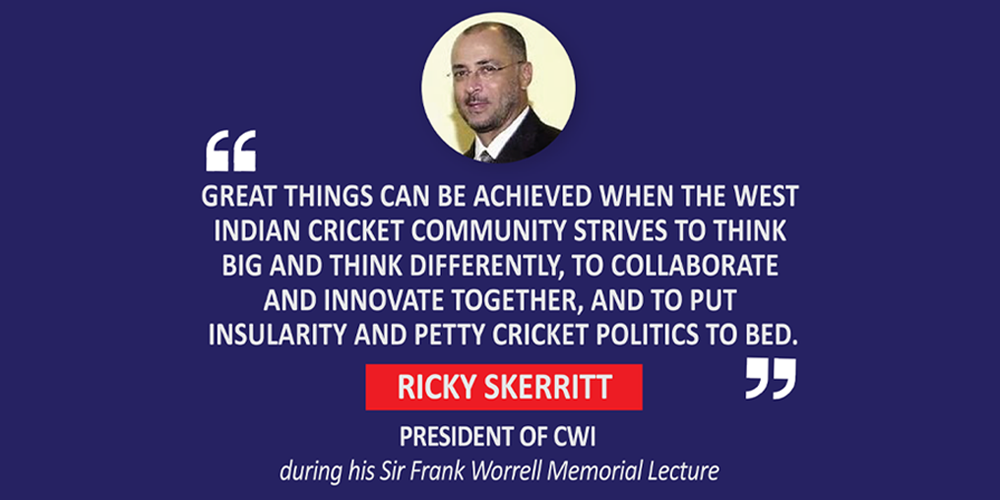
Photo credit: LinkedIn profile photo of Ricky Skerritt
At CWI, I believe we have stopped the knee jerking and reactionary fiddling at the wheel, and instead are now inspiring and demanding data-based and more collective decision-making from our executives. We are no longer afraid to be focused on medium and long term results. Rooted in a mindset that is both technological and entrepreneurial, we are revising our roadmap to help cricket forge into the future, confident that we can emerge from the current COVID-19 pandemic in the strongest possible shape.
I believe it was Winston Churchill who once said (I QUOTE)
“In the course of my life, I have often had to eat my words, and I must confess that I have always found it a wholesome diet.”
(END OF QUOTE).
I hope that my words to you tonight won’t have to be eaten by me or anyone else. Thank you.

